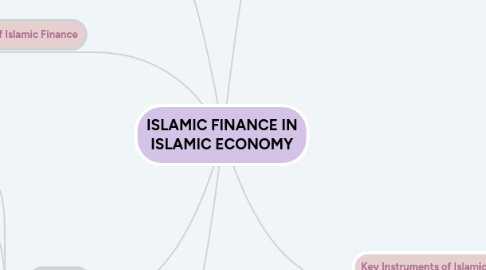
1. Principles Govern Islamic Finance
1.1. Equity
1.1.1. Zakat-assist the less fortunate and foster social solidarity
1.1.2. Prohibition of predetermined payments (riba)
1.2. Participation
1.2.1. Ensure a link between financing activities and real activities.
1.2.2. Ensure that increases in wealth accrue from productive activities
1.3. Ownership
1.3.1. Rule-do not sell what you do not own
1.3.2. Preservation and respect for property rights
2. Key Instruments of Islamic Finance
2.1. Profit & Loss Sharing (PLS)
2.1.1. Musharakah
2.1.1.1. Most authentic form of Islamic financing
2.1.1.2. Joint partnership-two or more partners provide capital to finance a project
2.1.1.3. Own real estate/movable assets
2.1.1.4. Profits distributed-pre-agreed ratios
2.1.1.5. Losses shared in proportion
2.1.2. Mudarabah
2.1.2.1. Sleeping partnership
2.1.2.2. Supplies funding-financier/principal
2.1.2.3. Provide effort-mudarib/entrepreneur
2.1.2.4. Ensure better management of capital
2.2. Non-PLS Contract
2.2.1. Murabahah
2.2.1.1. Shariah-compliant sale transaction
2.2.1.2. Deferred payment sale transaction-intention is to facilitate the acquisition of goods
2.2.1.3. Ta'widh-if buyer has deliberately refused to make a payment
2.2.1.4. Multistep transaction-tawarruq(not consider Shariah-compliant)
2.2.2. Ijarah-lease
2.2.2.1. Contract of sale of right to use an asset
2.2.3. Salam
2.2.3.1. Form of forward agreement-delivery occurs at a future date in exchange for spot payment.
2.2.4. Istina'
2.2.4.1. Contract in which a commodity can be transacted before it comes into existence
2.2.4.2. Contract directly between the end user and the manufacturer but bank as intermediary
2.3. Fee-Based Product
2.3.1. Wakalah-wakil
2.3.1.1. Bank act as agent of a customer in a trade transaction or issuing a letter of credit facility.
2.3.2. Kafalah
2.3.2.1. Financial guarantee-bank gives a pledge to a creditor on behalf of the debtor
2.3.3. Ju'ala
2.3.3.1. Essentially an istisna’ contract that is applicable for rendering a specified service
3. Auditing
3.1. Accounting and Auditing Organization for Islamic Financial Institutions (AAOIFI)
3.1.1. Issue accounting, auditing, and Shari’ah standards for financial reporting at Islamic financial institutions
3.2. Islamic Financial Services Board (IFSB),
3.2.1. Issue supervisory and regulatory standards and guidelines
3.2.2. Promotes the adoption of these standards and guidelines by relevant regulatory authorities
3.3. Malaysia-based International Islamic Liquidity Management Corporation (IILM)
3.3.1. Issue short-term Shari’ah-compliant financial instruments
4. Stylized Facts of Islamic Finance
4.1. Islamic Finance & Banking
4.2. Sukuk Market
4.2.1. Islamic bonds-structured in such a way as to generate returns to investors without infringing Islamic law
4.2.2. Undivided shares in the ownership of tangible assets relating to particular projects or special investment activity
5. Insurance
5.1. an agreement whereby an insurer undertakes to pay a policyholder a sum of money (or its equivalent) on the occurrence of a specified event
5.2. Contain prohibited elements
5.2.1. Gharar-uncertainty
5.2.2. Maisir-gambling
5.3. Include five elements
5.3.1. 2 parties (insurer & insured)
5.3.2. Aqreed premium
5.3.3. Amount to be paid to cover specific losses
5.3.4. Losses- should have chances to occur
5.3.5. Policy holder who is taking out the insurance should have an interest in what is being insured

